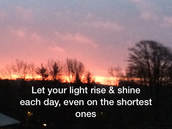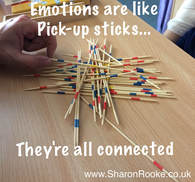|
18/10/2019 1 Comment What's the Blockage? This post started off with the title of What's the Hook? A question that I've found myself using quite a few times this week, albeit in different ways. But I kept getting stuck with what to follow. I guess this was my own blockage… So I changed it to What's the blockage? What's the blockage? Has a lot of resonance this week. Not just because somehow, some way I was having my own little block with what to share with you. But also, because it's one week since Khan had emergency surgery to remove a number of significant blockages. It's what happens if you eat your bed! I wanted to spare you from the mental image of this and chose this image of the trees changing colour instead. Eating beds isn’t unusual for puppies but Khan is a 6-year old 47kg dobermann! If you put the point of causality at this point, it was a blockage of his own making. At another point it could be our fault for buying the type of bed that unravels into a continuous string. It depends on the frame of reference. There's also been a blocked sink this week. Well, I say this week, it's been draining slowly for quite a while. The blockage has been a gradual thing. You know the type; the water builds up as the tap is running. Then it takes a while for it to clear. So, you put the drain buster down it. It’s not wholly unsuccessful, it runs quicker for a day or two, or maybe longer than that. But then, you have to repeat this, leaving it overnight…just to be sure. At some point you realise that it’s not worked the way that you wanted it to. Time to take the plunge! Ok, sorry for that! But nevertheless, it’s time to buy a plunger. You want to buy the big one, to make a really good job of it this time. Despite expectations, there wasn’t a sudden gushing of gunk; or even a spluttering of debris. There was recognition that gaffer tape was needed to cover up the other exit points. A supervisee also recognised a blockage, as they were working with a feeling of getting stuck with a client. We started to look at what the hook was? But moved on to clear the blockage. The next day I got this brilliant feedback; “Thank you for today. It was so helpful and was certainly a shit dip !!!!! But I felt that I was a lot more calm, in control and professional ...my god I shall be honing and using my knowledge...and learning with this.” How do you recognise if there’s a blockage? How do you deal with a blockage? Do you ignore it, until the water levels rise? Do you confront it? Do you deny it? Do you distract yourself? Sometimes it’s useful to tackle blockages head on. Sometimes other tactics bring better results. The sink is going to take more investigation. For now, it is running more freely. And we know that further routine maintenance is going to be needed. Khan is on the mend and acting more like a puppy. We’ve removed the offending beds, replacing them with vet bedding. He has been caught dragging this out of his cage, but the risk has been removed. There were a few days that keeping him quiet (!!!!) was critical. The obstacles has been removed, for good. What works best for you? I’m still working out how I’ve been blocking myself. And the best way to unblock… A bit like therapy really. Please feel free to leave a comment, or contact me Sharon Rooke, [email protected] 07966 453387
1 Comment
27/6/2018 0 Comments Boundaries and beliefs Boundaries are in abundance. They are all around us and in every part of our world. The physical boundary of our home; our bedroom; our work space; our car. They are the white lines in the middle of the road. The double yellow lines that say 'Don't park here' (no, not even when you've left your hazards on to let us know you're the hazard). The boundaries that are the hardest and the most important for us, are our personal boundaries. These are the boundaries that we get to set and choose. If we don't we will be shaped by others' boundaries. We won't have set our own, as in the words of Katy Perry, if you stand for nothing then you fall for everything! This is why we need to check boundaries, especially with our children. What was OK for them when they were 5 will be out of date when they're 15; obsolete at 25. Once we've set them, we need to protect them! It's not that we walk around all day checking in with our boundaries, unless you're a psychotherapist like me (it's an occupational hazard - sometimes I have my hazard warning lights on too, just to give my nearest and dearest the heads up) or you're going through an intense period of change, maybe you're recovering from an abusive or narcissistic relationship. Its really important that we take time to review and update our boundaries, so that we can become aware of boundary violators and protect our self esteem. It's OK to make it a priority to understand what's OK and what's NOT OK for us. Usually it's when a boundary has been breached, it's an opportunity to consider how that happened. If we think of boundaries as thresholds of what's acceptable and unacceptable for us, like windows and doors to our soul we can check to see if we're leaving them open. It may be OK for a friend to walk into your house without knocking on the door first; would you feel the same if it was a salesman? What about if a friend shares something juicy about another friend? Or you hear something out of context? You get stood up? A colleague hijacks a meeting? A meeting starts late or runs over? For me, I know if a boundary has been crossed because I get a little 'ugh' inside. It feels uncomfortable and I know it's information that I need to attend to. Even if it's someone else's boundaries, because I've had the 'ugh', that's mine. You see, what other people do, is up to them, what we do with it...that's ours. I could ignore it, and do 'lalalala' but experience has shown me that unless I set or reset the boundary it will come back and bite me. So I have to be clear, for me, otherwise we get resentful, hateful and pissed off (thank you Brene Brown for your insight and wisdom). Setting clear boundaries means you get to choose your limits. You decide what's ok and what's not ok for you. You are the doorman, you own the guest list. You make it clear what behaviours you are happy with and what you are not. This means that you are living according to your deeper values. You keep your integrity in tact. You are free to be more compassionate and loving with yourself. I heard from John (not his real name) yesterday, "I like to be a nice guy but it's got me screwed over". Being boundaried is about being nice but not being a doormat. Being nice begins at home, with ourselves. Saying Yes when we mean No, or No when we mean Yes is confusing. A client gave me this gem, "We teach others how to treat us!" If others around you have loose boundaries or are working on theirs, we're all on a different journey, free your energy up by assuming or presupposing that 'they are doing the best they can, with the resources they have available to them at this moment in time'. This may not seem as though it is true, but by allowing ourselves to have this as an observation point releases us from negative judgement. As one of the NLP presuppositions, this is a slogan that invites transformation. We don't have to agree or disagree, collude or accept; we can become curious about how it is for them, whilst keeping our boundary for us. Let me know your thoughts or challenges, leave a comment or get in touch [email protected] 17/4/2018 1 Comment Changing Beliefs Or Living in Fear By Sharon Rooke How many of us have experienced fear? Well probably everyone at certain times in their life. It isn’t always a bad thing; it is natural and really useful, essential for survival. It is important to learn the right level of fear, that is appropriate for the circumstances, to feel it in the moment, to take action that lets it go. So what’s the problem? Sometimes the fear can linger in the shadows. Staying with us long after the threat has gone. Sometimes we adapt the way we our life because of that fear we’ve kept hold of, long after the original event itself has passed. And holding onto it means it is more likely to spread into other areas of our lives. Impacting our lives in many ways, thinking of what might happen, living in fear. One client remembered, with absolute clarity, how shopping trips to Birmingham stopped suddenly after the dreadful bombings. This happened in the ‘70s. They weren’t directly involved in any way, they hadn’t been near there that day, there were no plans for the near future, no-one they knew had been involved. Yet it became up close and personal. Maybe because it mirrored the fear from their parents, that remained just under the surface. Maybe because every news clip lead with the impending doom. Maybe because they identified with the stories from media coverage of the event. It became very personal. As a result, even after all this time, cities are dangerous places. So, they avoid them, with fear lurking in the shadows of the streets and their mind. A survival strategy has turned into a Limiting Belief. A belief that we have decided to accept either about ourselves or the world we live in that limits the way we live our life. If you think of something that you would like to do, be or have that is currently impossible for you to conceive then the odds are it is a Limiting Belief that is lurking behind this barrier. Beliefs shape the world around us & our place in our world; who we are, what we can achieve and relationships with others. And then we ‘perform’ the behaviours that are aligned to this belief. “Whether you believe you can, or whether you believe you can’t.You’re absolutely right!” said Henry Ford The good news is that beliefs can and do change, they aren’t set in stone. Many beliefs that were once held as fact, or a truth have changed naturally over time. Were you, like me, told never to speak to strangers? Well that belief doesn’t work for networking or making friends. But it is important to learn who you can and can’t trust when you are younger. Perhaps that is the greater belief here! Follow this exercise to bust a belief that currently limits how you live your life.
A useful little analogy about limiting beliefs that I share with some of my clients is to consider how often you put the rubbish out. We are conditioned, aren’t we, to do this task or chore weekly, whether that’s household rubbish or recycling. The stuff that we no longer want that is no longer required that we have used and discarded; that is passed its best that is out of date. How many beliefs and their packages are stored in the cupboards of your mind that have passed their use by date? Sharon Rooke is a registered psychotherapist and supervisor with UKCP & NLPtCA. She is the vice chair of UKCP Ethic committee and an Exec member of Constructivist & Existential College. Previously, she has been the Chair of NLPtCA. She is a guest lecturer at Worcester University for the Psychology department. She is passionate about helping people be the best they can be; and has a private practice in Worcester and Edwyn Ralph; she also runs personal and professional development workshops. who specialises in NLP & Hypnotherapy. You can contact her on 07966 453 387 or [email protected] . Visit www.SharonRooke.co.uk for more details. 31/1/2018 0 Comments Why avoiding anxiety fuels fear And 5 things to do instead... Anxiety is horrible, it gets out of control really quickly and then seems to take over everything. It can start out as feeling slightly overwhelmed about a forthcoming event. Maybe a meal out with people that you know. And each time you think of this, your chest gets tighter and tighter. But this is ridiculous, why am I feeling this way! Oh no, fingers are starting to tingle. Time is doing that strange thing of slowing down and speeding up at the same time. How the hell is that happening? Nothing is stable. I'm going to make a fool of myself, stutter and trip over my own tongue. If I can get words out at all - they are definitely not going to make any sense. God! I'm going to sweat so badly - my hands, top lip. That very obvious anxious rash on my neck is pretending to be a red light in Amsterdam.. I can't cope!!! This may not be everyone's experience of but anxiety can quickly spiral out of control. Then it can creep into other areas of our lives. It breaches our boundaries. Leaking into areas that we were confident in, once. So we start to avoid those trigger points. We decline invitations. Stop doing certain things, going certain places or different places. Our life shrinks, we limit our experiences, because of the fantasy running in our head. The myths we've been told or believed in take hold - a tight grip. But there's hope, there's always hope. Here's 5 things that you can do instead, in no particular order...
1. Don't Believe Everything You Think - you have many thoughts throughout the day, some will come and some will go, many will be presented without spell check or proof-reading. View them at arms length. Begin to apply critical thinking "What evidence do you have?" 2. Breathe - ok, so you do this throughout the day, everyday but do it now with your full attention. Do 4, 7, 11 breathing and notice what happens. Get a slowish beat and start to count; breathe in through your nose of the count of 4. At the same rate, breathe out through your mouth for the count of 7. Repeat 11 times. Really let your breathe fill your belly, so you use your diaphragm for this. 3. Right Here; Right Now - anxiety rarely lives in the here and now time frame; being on the future or the past. This exercise brings you back to the present. It goes like this 5, 4, 3, 2, 1. State 5 things that you can see: 4 things that you can hear; 3 things that you can feel/touch, 2 things that you can smell, 1 thing that you can taste. 4. Focus - what is it that you want to have happen in the next hour, 30 mins or 10 minutes. As energy flows where attention goes this gains control and focus. But remember to say it the way you want it! 5. HUGs - you know Satir's take on hugs and survival, this is really true and we can also offer comfort and security to ourselves by using this approach. Hold Until Gremlins Subside - HUGS. Remember we are born to grow. For further help please contact me at [email protected] 11/9/2017 0 Comments The Trouble with Emotions The trouble with emotions is that they can get us in such trouble! They can make us do things that are out of character...such as shouting at our partner when we've seen something on FaceBook. Or feeling really angry about the car that cut us up. Or regretting that time when we wanted to try some different but were too afraid. Maybe you're surprised each time the green eyed monster raises its ugly head. And let's not even go near that place where we store the memories that bring on the shudder of shear panic and shame; at the mere thought of them! It’s ok, its not just you, we’ve all been there. But the trouble isn’t with the emotion. The trouble is what we do as we feel the emotions. We believe that we can’t cope with the big feelings; the scary feelings. We believe that we can’t handle them, that they’re a force that we have no control over. Some people even believe that other people are in charge of their emotions! They have handed their power over. You’ll notice this because they say, “you’ve made me angry!” or “they made me cry!” The responsibility is given to another; it could even be given to things like the weather. Listen out, for examples. Many of us have grown up in homes where expressing our feelings wasn’t only discouraged; it was actively squashed. Sharing that we feel like Bubble & Squeak [fill in your own meal horror] resulted in a lecture about the starving children in Africa or how hard your father worked to put the food on the table. We quickly learnt to keep our feelings, our wants and our needs under wraps. Having a bad day, feeling upset or feeling angry could be faced with “What have you got to be upset about?” or the classic “If you don’t stop crying, I’ll give you something to cry about.” The harsh words, or condemning looks became translated into rules; rules for us; rules about us. A child is shamed for expressing disappointment about having to go to the shop, may learn to disapprove of such a strong feeling; more often they learn that others disapprove of such strong feelings. So they get buried, denied, disconnected. We don’t learn how to lean into them. We don’t learn how to process them. We don’t learn how to use them. We don’t learn how to get the most from them. But the great news is that we can! It is never too late. We can learn how to feel emotions and use them to inform our decision.
24/3/2017 1 Comment Everyone Loves A Drama It's true, is't it that everyone loves a drama. We can easily get caught up in the excitement, the buzz, the thrill of the drama. The energy it creates can break us out of the dull-drum. Suddenly there's something or someone to focus on. Finding out about what's happening, or happened, or about to happen feeds into our natural curiosity. But at what cost? When I was learning psychotherapy, many many years ago now, I was introduced to Karpman's Drama Triangle; from Transactional Analysis. To say I didn't welcome this model with open arms would be an understatement. I went into my own 'stuff' - very technical term, big time. There may even have been a little temper tantrum of two, to be fair. There are 3 positions in the drama triangle; The Persecutor - I'm out to get you; The Rescuer - I'm out to save you; The Victim - they're going to get me, save me. In the good old dramas the roles are clear cut. Take Harry Potter, in the very first scene of the first movie the roles are established; Harry Potter is the victim to Voldemort, thank goodness for Dumbledore. Then as the story progresses and the plot becomes more complex, because life is like that, roles swap over. In our daily life we inadvertently or unconsciously take on these roles or states. When taken on without question, review or reflection these can lead to one of the most restrictive beliefs. States becomes Traits We are always meant to be more, we are always meant to adapt, to grow, to evolve. But in the exercise, all those years ago, I was stuck. The persecutor was well known to me in my past but no longer fitted. The rescuer brought me out in cold sweats, putting my big pants on the outside was a big no no! The victim was out of the question; the rule of 'we fight in this family' was well and truly embedded. So where to next. The model shows the Adult. The optimum role, the place to be. This is outside of the drama triangle. From this safe place we can not be pulled into these states, whereby we are at the mercy of others. So in the exercise, where we were asked to play out the role, I took the Adult role...or did I? Really? Nah! I wasn't in Adult, I was guarding myself with a pretend Adult. This involved putting up barriers, not saying what i would like to say. Because I didn't think the relationship I had with the others that were playing, was strong enough to take even a light-hearted little role play. There wasn't the trust there, there was too much self-conscientiousness whilst being watched and assessed. Adding to by the feedback that 'Adult is boring' But staying outside of the drama is different to being adult, and being adult is not boring but acting adult is. So what can we do. Well this is a lifelong process, thankfully. This is an aim along the journey, not a destination. So be kind to yourself. If you recognise that you're triggered into one of these states start to notice...notice which state you've defaulted in...notice your behaviours (sometimes it can be easier for us to notice others' behaviours and our responses to them)...notice your feelings (the ones on the surface and the ones below them, they can offer great insights)...notice which buttons are being pressed (they will have rules attached to them)...notice that space that lingers between the stimulus and response. In this space is your creative zone, this is the land of choice, where you can locate your resources. I will sign off using the beautiful words of Virginia Satir... "And now again, become aware of what we always have with us; our resources - our ability to see and hear and touch and taste and smell and feel and think and move and speak and choose. All of these were given to us because we are human beings. these are our resources that take us anywhere we go. therefore, wherever we go we are always well equipped. Our job is to access and connect with and learn to use these wonderful resources." Visit www.SharonRooke.co.uk/courses for dates of the next courses to help you to learn, change and grow.  Have you ever experienced a case of mistaken identity? Where you've done a double take. Do they mean me? Is that how they see me? Is that who they think I am? Or have you done this for yourself. Given yourself your own mistaken identity. When we peel back the layers, we can find many identities lurking in the midst, can't we. Identities that have either been given to ourselves, with the best intentions. Identities that we have given ourselves, again with the best intentions. Where do they come from, these mistaken identities. From our childhood - don't call me baby, that no longer fits with who I am. From school - nicknames that we went by. From jobs - the roles that we have in our lives. Identities can come from any context in our lives. Working out whether they are who we are and if they are useful for us is what's important. There are two common areas of mistaken identity; health and emotions. People identify with symptoms, ailments, conditions or illnesses, "I'm diabetic." "You're bulimic. "They're smokers." "I'm sick". The diagnosis gets promoted into who they are. So everything else about who they are becomes overshadowed, or upstaged. Notice what happens when this gets altered to a symptom etc "I have diabetes." "You have bulimia" "You smoke" "You feel sick." We have opened up resources within ourselves to be able to deal with, change or alter our experience. Along with this our emotions can take over our identity, rather than feeling our emotions - we become them. "I'm happy." "I'm sad." "I'm disappointed." "I'm scared." "I'm angry." Emotions are really important. But to elevate them, to over-promote them...we can all think of a time when someone was promoted beyond their capabilities and how that worked out, can't we?They created a richness and depth of feeling to our experiences. They shape our world. But our emotions are not the world in it's entirety, as they are not our identity. The hormones, sensations, feelings and reactions that lead to our definition of the emotions that we are feeling is an incredible resource available to us. They can let us know of changes around us and within us. They can also help us to make changes around us and within us. Our emotions can guide us; can draw our attention and can help us attend to the changes that are necessary or desired. One of the many important parts that a parent has is to help the child make connections. To let the child know that what certain things are, to name objects (ball, chair, table), verbs (eat, sleep, catch), adjectives (bouncy, kind, tall) usually through repetition, lots of repetition. So a parent is observing their child, and noticing the signs of tiredness says, "You're tired!" after many times of rejecting this concept - No I'm NOT and having it reinforced the child learns. This can also be true for the well meaning parent who instructs "You're naughty!" Learning to separate who they are and what they are doing is such a valuable skill. Take this forward, they can become susceptible to projective identification or introjected personification. "He's naughty" can grow and evolve. Becoming part of who he is. This can then lead to limitations later on, on how they see themselves, their world, opportunities and choices. Understanding this process we can learn to detach and separate behaviours and identities. In many of her wonderful meditations, Satir would invite us to go to that place deep within yourself where you keep that treasure that is called by your name and as you approach lovingly, gently, excitedly, notice your resources, your ability to see, hear, touch, taste, smell, feel, think, move and choose. Considering roles and rules are one of the items covered in Empowering Women workshop, 14th Oct. For empowering women, unlocking true potential. Contact me for details. 22/4/2016 1 Comment On grief and grievingThere's been so many heroes and celebrities dying in 2016. More than any other year that I can remember, by April. In each area, an important figure in our life has gone. This could be from comedy, the last of the two Ronnie's or Victoria Wood; music, David Bowie or Prince; movies, Alan Rickman the list goes on...
They've have been role models and idols. They were party to some of the most significant people in our life. Their words speaking only to us. Their songs singing the shadows from our souls. Companions through our tears and joys. The grief we feel is real. Even though we may not have known them personally, it was personal. Accepting this releases our denial. The feelings that I had when Chris Moyles left radio 1 were of loss. What would I do now? Feeling angry is also a natural response. The grim reaper has gone too far now! Enough already and FFS express some of this emotion. Anger itself isn't a bad emotion, if is relevant to making the changes from it. Dr Elizabeth Kübler-Ross stated that if we feel anger for longer than 15 second then it's connected to unfinished business and can fester. Bargaining is another stage and strategy of coping. Have you seen the take politicians, pedophiles, Bieber or Kane instead? Trying to take some control, to gain a sense of perspective. Be sad. Let your tears flow. Appreciate the joy they brought to your life. Even give yourself time to play out the fantasy relationship you had with them. And feel the gratitude for your memories. Check out my website for more hints and tips and also upcoming courses www.sharonrooke.co.uk Www.scrassociates.com Creating An Attitude of AgreementIf you’re arguing with a fool, stop and make sure they’re not doing the same.
Creating an attitude of agreement with someone whose point of view you disagree with does seem paradoxical, especially a child that is wrong! And before you disagree with this hint to agree...just wait a moment. What happens to you when you think that you have to defend your position? If you’re like most people, our mind closes down and we get ready to dig in, to defend or attack. When someone tells us we are wrong, it feels as though we are under attack. That we need to shut down the boundaries, and bring out the barriers and barricades. We are unlikely to be in a mind-set, or have an attitude where we will be able to find any commonality. If you see agreement as a loss of personal power, then you are playing a power game of win or lose. The question from here would then be “At what cost are you willing to win? If agreeing with something that you disagree with is too much of a challenge, check your attitude. How are you picturing the situation? What are you seeing yourself in this image? What expression are you wearing on your face? Attitudes ooze out of our bodies, they leak from us. Attitudes are an expression of our feelings towards someone or something else. Whilst you visualise yourself with an attitude of agreement of the person, notice how this attitude of agreement moves you away from an conflict of being right or wrong and into a frame of understanding, learning and growing. Understanding what’s going on for them, learning what they want and growing from the experience of finding other ways to achieve this or a bigger outcome. Let’s think of this another way, if everyone else is disagreeing with you, how does that feel? Isolating, alone, attacked, unloved, abandoned and rejected? These may seem like pretty strong words, but for a child this is part of their reality. They know that you are responsible for their survival, they have to be attached to you or they die, they know this like you did as a child, without even knowing how you knew. Children need you to make you love them enough to keep them alive, they need this attachment. And most of the time this is ok, right! And there are those times…when…oh…yep those times. Give yourself a couple of breaths to clear and open with a positive attitude to agreement, where you validate your child, “you’re right” and change their behaviour. This is easier with an attitude of agreement. When you think of someone agreeing with you, how do you feel? Do you feel validated? Do you feel your opinions are valued? Do you feel that your thoughts are appreciated? How does that feel in your self-worth and self-esteem? How does it feel being able to let your child to feel these feelings of validation, value, appreciation too? If you are unable to agree with the content, are you willing to give the gift of gratitude, importance and validation to your little person? If a person is important to you (your child, your partner, your parent) then the attitude of agreement is a small present that means so much, a bit like giving diamonds really. You see we don’t all live in the same reality, we don’t respond to the world as it is, we respond to the world as we are! There are some presuppositions, assumptions or slogans that provide greater choice and enable change easier. Even though there is not one definitive list of the NLP presuppositions, one of the agreed presuppositions is that we each create our own Map of the World. There is no such thing as reality, reality is a construct, we create our own reality. A rainy day to Mike is a horrible day, getting wet on the way to school but to Sally it’s put those wellies on puddles here we come, splashing all the way to school. I bet you can already imagine the different attitudes being communicated in this example. Finding out others people’s model of the world, their map of the world, is fascinating. Learning how theirs is different from ours is captivating. Agreeing with them means that you have joined them in their map of the world, here you don’t have to take on their perspective but you are able to acknowledge they have a different point of view to you. Rather than trying to convince them that you are correct, adopt the attitude of finding ways where both of you are correct. Or accepting their reality; acknowledging, without having to own it as your own. Essentially agreeing that there are different perspective and lenses for the situation, that you both your own version of events. Simply having this attitude can transform the situation in itself. When you then offer, sincerely and genuinely “you’re right” notice what happens. One way that you can begin to develop this skill is as you’re watching TV or listening to the radio, anything that you’re not directly involved in, and saying to “You’re right” to whatever the reporter is stating. When others have done this they notice that they find they are more open minded to new ideas or listening with the intent to hear than they were before. So the next time that you find yourself entering into an argument, look for what you can agree about and then start your next line with “You’re right and…” let me know how it goes for you. Have a look at the upcoming courses and events, there's a couple next months...come and join me 3/4/2016 1 Comment How to avoid disappointmentThere is a familiarity around disappointment that for some offers comfort. Whilst this may sound odd think about it just for a little while. There is comfort in familiarity. We know what to expect, we can even get real good and actually predict the disappointment. We will have a routine around how we deal with the disappointment. Do you lean into it, push against it or move away from it.
Moving away from it, we dismiss it, shrug it off like shooing away a fly. But as we deny it, we deny or feelings and emotions. "No, it's fine, it doesn't matter, it's alright." Yes, I've become an "it", so now I'm not only denying my emotions I'm also objectifying myself. Telling the world one thing, Feeling hurt and pain inside. Ouch Pushing against it, I retaliate, fight back, hit out. This may "show them" "get them to pick on someone their own size" "best form of defence is attack". Here the message is if I hurt you, you can't hurt me. The irony of this strategy is that we get hurt more, double boom. Creating pain on the outside and on the inside. When we lean into it, we can breathe and stay grounded. Here we can keep an open mind and question whether our judgements are useful. Rather than are they right! The expectations that we had can be considered through a grounded lens. They can be amended, updated, met by ourselves or let go of. And the disappointment...disappears |
Archives
October 2019
AuthorSharon Rooke Categories |
Search by typing & pressing enter

